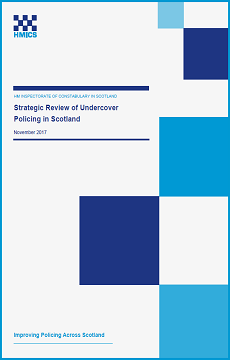This strategic review of undercover policing in Scotland had been directed by the Cabinet Secretary for Justice and was undertaken by HMICS in terms of Section 74(1) of the Police and Fire Reform (Scotland) Act 2012.
The Cabinet Secretary for Justice wrote to HMICS on 22 September 2016 and set out the expectations of this review, details of which are outlined within our Terms of Reference which were published on 11 January 2017. Our review methodology is detailed in Appendix 4 of this report.
Using our HMICS Inspection Framework we conducted an assurance review of the wider operating practices of the Special Operations Unit (SOU), which sits within the Specialist Crime Division (SCD) and has responsibility for the undercover policing portfolio in Police Scotland. We objectively assessed the systems and procedures in place and checked compliance with relevant codes of practice, guidance and recognised best practice. Our fieldwork included a review of all undercover authorisations since the establishment of Police Scotland in 2013 and we conducted interviews with all of Police Scotland’s qualified undercover officers.
We have provided an independent analysis of the extent and scale of undercover policing operations carried out in Scotland (i) by Scottish policing including legacy Scottish police forces and, (ii) by the Metropolitan Police Service Special Demonstration Squad (SDS) and the National Public Order Intelligence Unit (NPOIU).
Our analysis covered the sixteen years since the introduction of both the Regulation of Investigatory Powers Act 2000 (referred to as ‘RIPA’) and the Regulation of Investigatory Powers (Scotland) Act 2000 (referred to as ‘RIP(S)A’) and in practical terms, this represents the period from 1 October 2000 until 31 December 2016.
As a consequence of our review, Police Scotland will be asked to create an action plan in order that our recommendations are taken forward. We will monitor progress against this plan and publish our findings as part of our annual reporting process.
Number | Recommendation |
|---|---|
1 | Police Scotland, in partnership with key stakeholders, should develop a strategy and supporting implementation plan for covert policing, which provides for a sustainable model of undercover policing and contributes towards the delivery of Policing 2026. |
2 | Police Scotland should ensure that a dedicated and trained covert operations manager- undercover (COM-UC) who has day to day responsibility for the Special Operations Unit (SOU) is maintained. |
3 | Police Scotland should demonstrate a process to ensure that undercover officers comply with and uphold the principles and standards of professional behaviour set out in Police Scotland’s code of ethics. |
4 | Police Scotland should introduce an effective tasking and co-ordination process that supports the release of trained undercover officers from local police divisions and departments. |
5 | Police Scotland should enhance the training for senior investigating officers to include the management of proactive intelligence-led operations. This should include the use and conduct of undercover officers and the requirements under RIP(S)A, codes of practice, disclosure, the management of intelligence and reference to the Authorised Professional Practice (APP) for undercover policing. |
6 | Police Scotland should introduce effective processes to ensure that the COM-UC in conjunction with the senior investigating officer is actively involved in the risk assessment of material collected by the undercover officer. |
7 | Police Scotland should introduce an independent audit regime for the management of productions held by the Special Operations Unit. |
8 | Police Scotland should introduce a register of all covert assets and technical equipment held by the Special Operations Unit. This should be subject of independent audit and review. |
9 | Police Scotland should introduce a process to undertake a results analysis that demonstrates the impact of the undercover policing deployment in achieving operational objectives. |
10 | Police Scotland should engage with the College of Policing and progress a self-assessment of the authorisation, governance and tactical management arrangements in place for undercover policing as part of a formal process of national accreditation. |
11 | Police Scotland should use the covert compliance group to take forward recommendations and those areas of improvement identified by the Investigatory Powers Commissioner’s Office (IPCO). |
12 | Police Scotland should identify a human resource professional to provide advice for officers and staff who operate in specialist covert policing roles and who are subject of psychological support and counselling. This should include undercover officers. |
13 | Police Scotland should introduce a welfare-based policy for substance misuse testing of active undercover officers. This should provide additional guidance and support to undercover officers to self-disclose alcohol or drug related problems or issues. |
14 | Police Scotland should introduce a secure ICT solution for maintaining cover officers’ welfare and policy records. |
15 | Police Scotland should establish effective backroom support and office manager roles within the Special Operations Unit. |
16 | Police Scotland should introduce an integrated record management solution for the management and supervision of undercover policing. |
17 | Police Scotland should strengthen the financial management of covert accounts and introduce an independent financial audit regime with improved reporting. |
18 | Police Scotland should strengthen its engagement process with the Crown Office and Procurator Fiscal Service (COPFS) around undercover operations, including notification, operational parameters, special measures and disclosure requirements. |
19 | Police Scotland, in partnership with the national undercover working group (NUWG), should establish a formal process for the reciprocal notification of cross border undercover operations which includes legend building. |


